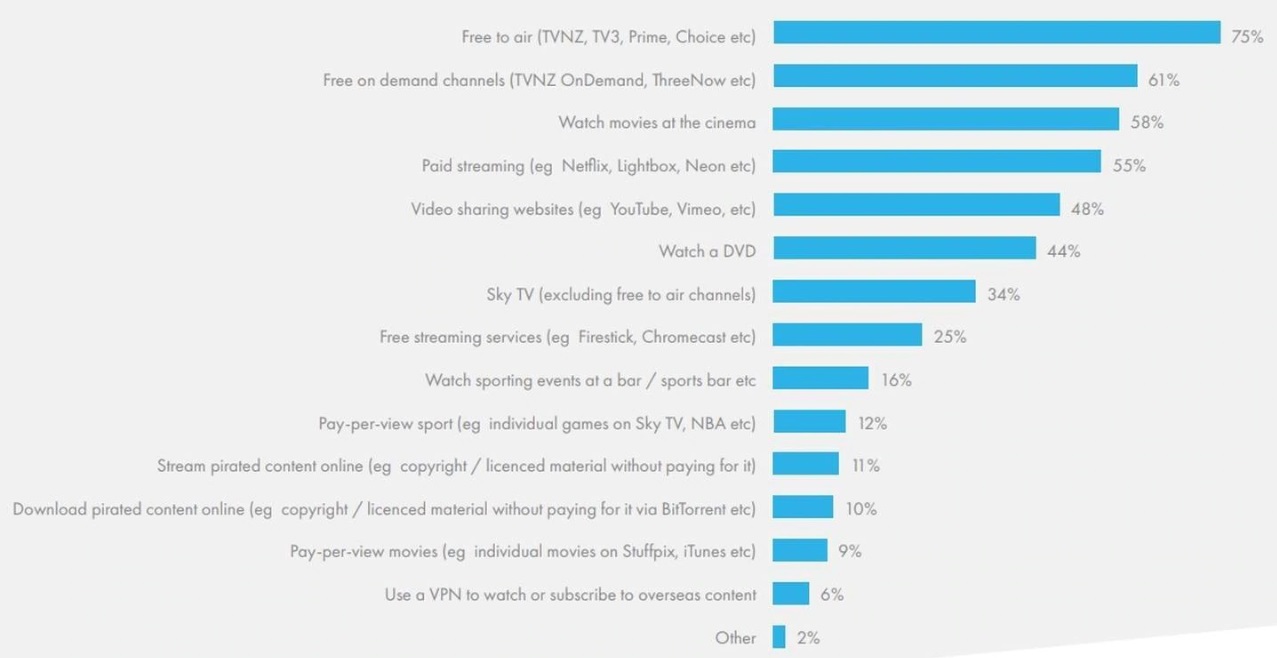
Independent research commissioned by Vocus indicates "piracy is dying a natural death," the company's consumer GM Taryn Hamilton says.
The survey of 1000 adults, carried by Perceptive during December and weighted to census data, shows that people are willing to pay for content if it's offered at a fair price, Hamilton says.
"About half the people had pirated content at some point in their life, but only about 10 per cent of people say they pirate today," Hamilton says (see graphics below).
"Only about 3 per cent of people prefer to pirate as their main source of content," he said.
To persuade the holdouts not to pirate, he would like to see more carrot (more and easier access to commercial online content, including more free content) and less stick (punitive legal action against pirates).
Of course, not everyone will want to cop to piracy when surveyed, but the GM says the finding matches shifting traffic patterns Vocus has seen in its stable of ISPs (Orcon, Slingshot and Flip). Peer-to-peer services, usually associated with piracy, used to be "the dominant source of traffic on our network."

Internet NZ public policy head Andrew Cushen says he's not surprised by the findings: "Rights holders have done well by innovating and building great ways of sharing content at fair prices. Piracy isn't the big challenge it once was because of this innovation, which consumers are using in droves," says.
The research comes in the early stages of a review of the Copyright Act (1994).
Lawyers have struggled to frame internet-age disputes under the current law, which was authored before music and video streaming had even been conceived - let alone gone mainstream.
A prime example was when Orcon (now part of the Vocus stable) introduced a "Global Mode" option in 2015 that allowed New Zealanders to access the (and pay for) the US version of Netflix, with its wider selection of content.
Sky TV and its allies took legal action against Orcon and others who used Global Mode, but both side's lawyers struggled to articulate how the 1994 law applied to their arguments. The case was ultimately settled out of court on the eve of the sale of the CallPlus Group (including Orcon) to M2, which later merged with Vocus.
Hamilton hopes the Copyright Act will address that issue of what could be seen as virtual parallel importing.
More, Sky TV has been pushing for ISPs to block sites that it sees enabling sports piracy.
Hamilton's company, backed by Spark and 2degrees, says site-blocking would load them (and ultimately consumers) with expenses and ultimately be futile in a whac-a-mole environment. It's not ISP's role to police content, Hamilton says.
"People know there are multiple sites where it is possible to download illegal material. They also know that blocking the most popular ones simply means you'll get pirated material elsewhere, Hamilton says.
Sky says while piracy might be on the wain overall, the past year has seen a spike in sales of "Kodi" boxes that facilitate piracy, especially of live sports events. The pay-TV broadcaster argues that site-blocking has been an effective anti-piracy weapon in the US and Australia.
Updating the rules
The Copyright Act review also includes discussion of wider "fair use" provisions, which could clarify and liberalise provisions for making an online backup of a piece of content, or shifting it between different media.
The Copyright Act update was delayed for years while Trans-Pacific Partnership talks dragged on, although front-foot intellectual property provisions pushed by the US where ultimately watered down and the US, in the final event, pulled out of the trade pact.
An interim measure, The Copyright (Infringing File Sharing) Amendment Act (2011), popularly known as the "Three Strikes" or "Skynet" law, fell into disuse.
The music industry only took a handful of cases to the Copyright Tribunal under the Act, generating low penalties and some bad PR as a soldier was fined for flatmates downloading pirated versions of songs while he was serving in Afghanistan. The movie industry brought no cases under the Act, saying it was too expensive and impractical.
"The copyright review is an opportunity to enable greater collaboration and creativity through harnessing the power of new tech," InternetNZ's Cushen says.
Submissions on the government's Issues Paper: Review of the Copyright Act (1994) are due by April 5 ahead of a legislative update that could take place later this year.














